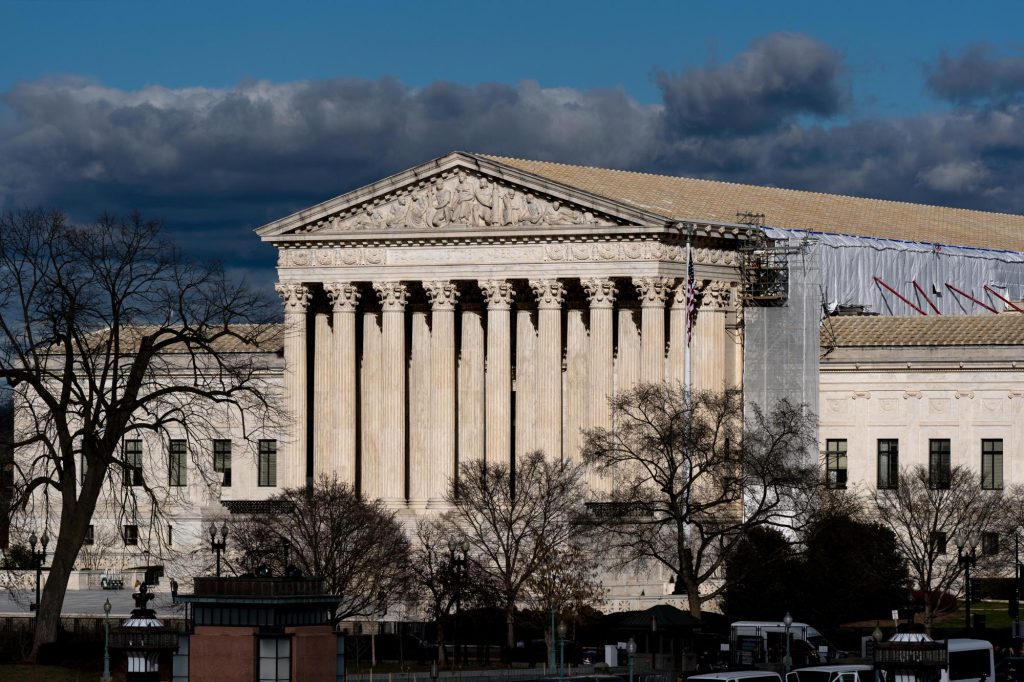By MARK SHERMAN (Associated Press)
WASHINGTON (AP) — The Supreme Court appeared likely on Tuesday to uphold access to a medication that was used in nearly two-thirds of all abortions in the U.S. last year, in the court’s first abortion case since conservative justices overturned Roe v. Wade two years ago.
During almost 90 minutes of arguments, it seemed like there was an agreement that the abortion opponents who challenged the FDA’s approval of the medication, mifepristone, and subsequent actions to make it easier to get, do not have the legal right, or standing, to sue.
If that happens, the current rules allowing patients to get the drug through the mail, without needing to visit a doctor in person, and to use the medication to cause an abortion up to 10 weeks of pregnancy, would remain in place.
Solicitor General Elizabeth Prelogar, the Biden administration’s top Supreme Court lawyer, said the court should make it clear that the anti-abortion doctors and organizations that challenged the FDA’s relaxation of restrictions on mifepristone don’t have the legal right, or standing, to sue.
Even three justices who were in the majority to overturn Roe posed skeptical questions about standing to the lawyer for the abortion opponents. Justices Amy Coney Barrett, Neil Gorsuch and Brett Kavanaugh are former President Donald Trump’s three Supreme Court appointees.
Barrett, for example, seemed to doubt that the doctors identified by lawyer Erin Hawley could show that were actually harmed by the FDA’s actions, one of the requirements for showing standing.
“The difficulty, to me, is that the affidavits do read more like conscience objections,” Barrett said.
Abortion opponents want the justices to approve a ruling from a conservative federal appeals court that would limit access to mifepristone, one of two drugs used in medication abortions.
The high court’s return to the abortion thicket is happening in a political and regulatory environment that was changed by the abortion decision in 2022 that led many Republican-led states to ban or severely restrict abortion.
That ruling had immediate political consequences, and the outcome in the new case, expected by early summer, could affect races for Congress and the White House.
The scene outside the Supreme Court was lively Tuesday morning, with demonstrators occupying the streets surrounding the court and groups on both sides of the issue marching and chanting. The police blocked traffic surrounding the court as well.
The practical consequences of a ruling for abortion opponents would be dramatic, possibly halting the delivery of mifepristone through the mail and at large pharmacy chains, reducing the period in pregnancy when it can be used from 10 to seven weeks and ending increasingly popular telehealth visits at which the drug can be prescribed.
President Joe Biden’s administration and drug manufacturers warn that such an outcome also could undermine the FDA’s drug approval process more widely by inviting judges to second-guess the agency’s scientific judgments.
Doctors and medical groups against abortion are saying that the FDA's choices in 2016 and 2021 to make it easier to get the drug were not sensible and may put women's health at risk nationwide. The Democratic administration and Danco Laboratories, the maker of mifepristone, argue that the drug is one of the safest ever approved by the FDA.
One possible outcome is that the justices may avoid addressing the more politically sensitive parts of the case while still keeping access to mifepristone. The administration and Danco claim that the challengers do not have the legal right to sue. If the high court agrees, it would basically throw out the case and undo the appellate ruling.
Another abortion case is already scheduled. Next month, the justices will discuss whether a federal law about emergency care at hospitals should include abortions, even in states that have banned them.
The mifepristone case started five months after the Supreme Court overturned Roe v. Wade. Abortion opponents initially got a broad ruling almost a year ago from U.S. District Judge Matthew Kacsmaryk, a Trump nominee in Texas, which would have taken away the drug's approval completely. The 5th U.S. Circuit Court of Appeals upheld the FDA's initial approval of mifepristone, but it would undo the changes regulators made in 2016 and 2021 that made it easier to administer the drug.
The Supreme Court halted the appeals court's modified ruling and then agreed to hear the case, although Justices Samuel Alito and Clarence Thomas would have allowed some restrictions to take effect while the case continued.
Mifepristone is one of two drugs used in medication abortions, along with misoprostol. The number of medication abortions has been increasing for years. Over 6 million people have used mifepristone since 2000. Mifepristone is taken first to dilate the cervix and block the hormone progesterone, which is needed to maintain a pregnancy. Misoprostol is taken 24 to 48 hours later, causing the uterus to contract and expel pregnancy tissue.
Health care providers have said that if mifepristone is no longer available or is too difficult to get, they would switch to using only misoprostol, which is somewhat less effective in ending pregnancies.
___
Follow the AP's coverage of the U.S. Supreme Court at https://apnews.com/hub/us-supreme-court.









